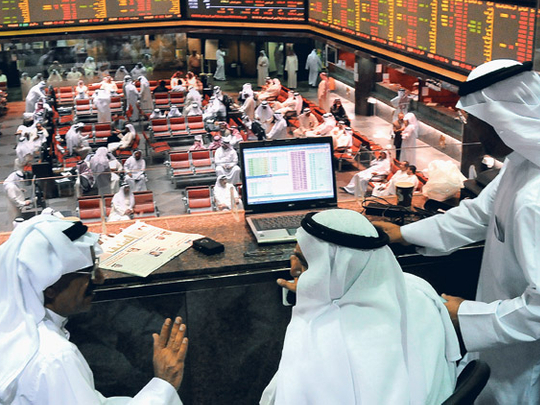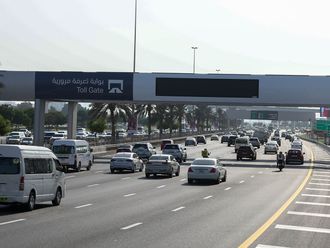
Saudi Arabia will continue to lead a recovery in the number of new share issues in the Middle East and North Africa this year as economies pick up pace after the 2008-2009 slump.
"Though the number of IPOs [initial public offerings] increased in 2009, the size of the issues declined significantly," said Shailesh Dash, founder of Al Masah Capital.
"We expect this trend to continue till late 2010. Saudi Arabia is expected to witness the highest number of issues," Dash said in an emailed response to Gulf News.
The Caymans-headquartered alternative asset management firm said in a report on Mena, India and China IPOs that fund-raising through equity share issues in the Mena region rose significantly in the first quarter of 2010 with the volume of funds raised almost doubling compared to the corresponding period last year.
Regional IPOs in the first quarter of 2010 raised $6.8 billion (Dh24.9 billion) through 62 issues compared to $3.7 billion in the same period last year through 29 issues, signalling a strong recovery in the IPO market, Al Masah said.
"With the global recovery picking up pace, we should see increased optimism and activity towards the end of 2010," Dash said.
"The global recovery seems to be on track and the International Monetary Fund's revised estimates for 2010 — from 4.2 to 4.6 per cent — are hinting to that. However, the economic conditions in the Eurozone are still fragile. That region slipping further and the resulting contagion effect could be a dampener for the MENA region's sentiments."
Recovery
According to the investment banker, second-quarter earnings will also "play an important role in helping us identify a recovery since results have been lacklustre" so far.
"Our tempered optimism for the second half of the year is based on the fragility of the global economic recovery," he said.
The Mena IPO market withered in 2009 as the economic slowdown cast a shadow on markets across the globe. The region's companies raised a mere $12.8 billion from 191 IPOs last year, a decline of 82 per cent year-on-year in absolute figures. The first quarter of 2009 was the worst for the Mena IPO markets.
World markets witnessed a sharp downturn in 2009 due to the financial turmoil. The global IPO market was heavily affected and the Mena region was not spared.
The quarter witnessed a 58 per cent year-on-year decline in IPO values in the region when the slowdown was at its peak. "The fall in IPO activity can be ascribed to the drying up of liquidity and the intense risk-averseness adopted by investors as a result of the financial shock," Al Masah said.
Despite the slowdown, the Mena region still attracted $3.7 billion of IPOs from 29 deals in the first quarter of 2009. Kuwait emerged as the top performer with five FPO listings totalling $2 billion in the quarter, of which Gulf Bank raised the largest amount ($1.3 billion).
Saudi Arabia's Banque Saudi Fransi also came up with an FPO of $472 million during the same period. "As the global economic recovery strengthens, Mena is likely to witness larger issues driving the future IPO market activity in the region," said Dash. "Companies in the region will be eager to enter the IPO market as investor appetite grows stronger.
"Moreover, some regional indices that plummeted at the start of 2009 have rebounded since September 2009 and renewed investor interest in the stock markets is expected to increase momentum in regional IPO markets this fiscal."
The main driver of growth in the Mena IPO market, however, would be government initiatives aimed at diversification to reduce dependence on the oil sector, he said.
According to Al Masah's research, Saudi Arabia has the highest number of announced IPOs from the 2010 pipeline, accounting for 47 out of the total 106 issues in the region.
Planned IPOs span various sectors such as telecommunications, construction and real estate. The UAE follows with 25 IPOs, mostly from the real estate sector, whereas Bahrain and Kuwait announced six and five IPOs, respectively.
Libya is also expected to see a surge in IPO activity this year as the government considers reforming its regulatory capital market authority to adapt to international norms and attract regional as well as international investors to its stock market.
In the region overall, a staggering $16.6 billion worth of IPOs might emanate from the real estate sector alone and $9.9 billion from the transportation sector in 2010.
While the real estate sector is expected to come up with 27 IPOs during the year, 19 are expected from the transportation sector. "Apart from these, the financial services sector is also expected to come up with 23 IPOs worth $3.8 billion in 2010," Al Masah said.
"Plummeting oil prices slowed down overall economic activity in the Mena region in 2009, impeding the diversification strategies of many oil-dependent economies in the Middle East," said Dash.
"Slower growth in public spending dented business activity, forcing many investors to pull money out of stock markets. Consequently, stock markets in the Mena region plunged, reducing investor interest in IPOs and forcing many companies to either postpone or cancel their IPOs.
"All this has been put behind as the IPO market braces up for a strong comeback in 2010."
Investor appetite in the UAE is still weak, Dash said, "but as economic activity recovers, risk appetite will follow and this will spill over into the IPO market". "UAE is characterised by very active banking and real estate sectors, with many of the companies in these sectors highly indebted. "We believe, as the market sentiments improve, these fund-starved real estate and construction companies, as well as select banking institutions, may go for money raising from the public," Dash told Gulf News.
"The Dubai World creditors meeting scheduled for Thursday holds significance here. If the meeting ends with the company successfully reaching a settlement with the creditors, that will go a long way in boosting the regional investor sentiment, especially towards real estate and construction companies."
If the interest expressed by Nakheel and Emirates in going public comes to fruition, "if not his year but later on", then the real estate and transport sectors "will automatically be the leading fundraisers" in the UAE, Dash said. "Apart from these, the financial services, health care and construction sectors in the GCC are expected to witness select IPO activity.
"Certain banks, for example, are facing the issue of growing non-performing loans and capital adequacy after the financial crisis and they may take the IPO route."
Public offerings
In contrast to previous fund-raising activity when the cash was deployed for expansion, future IPO-generated money is likely to repay debt or strengthen balance sheets.
"The trend witnessed over the period 2003-2008 in the Mena region's prominent IPOs suggest that the majority of the capital was raised to fund the aggressive expansion plans amid robust economic growth," said Dash.
"For instance, among the largest IPOs of 2008, Zain Group raised $4.5 billion [Dh16.5 billion] to fund its expansion in Bahrain as a part of its regional expansion strategy. Riyad Bank also raised $3.5 billion, the second largest IPO of 2008, to set up an insurance firm as part of diversifying and expanding the bank's financial services business.
"In another prominent IPO during 2008, Saudi Arabian Mining Company raised $2.4 billion to fund the cost of a 740,000-tonne aluminium smelter project with Rio Tinto.
"However, going forward, some of the funds that are expected to be raised through IPO could be utilised to pay down debt, especially in the case of real estate and construction companies, or to enhance the capital base in case of financial services firms," Dash said.
— Staff Report
Do you think it is the right time for companies to be offering IPOs? Is the global economy stable enough to sustain new shares? Are you aware of any new shares for purchase?












